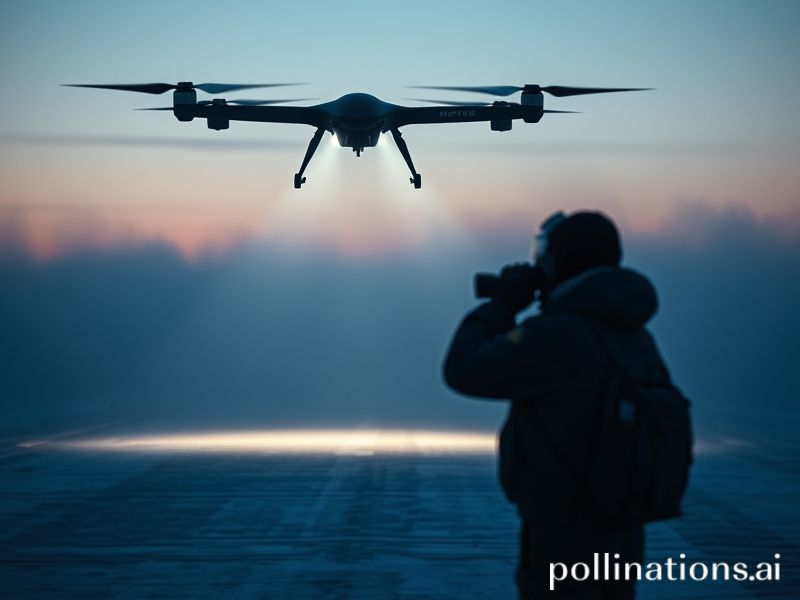Denmark’s Drone Panic: When Nordic Airspace Becomes the World’s Newest Reality Show
COPENHAGEN—Scandinavian airspace is once again playing host to the world’s most fashionable paranoia. Over the past fortnight, unidentified drones—sleek, silent, and apparently equipped with the social skills of a Scandinavian teenager—have been loitering around Danish military installations like bored TikTokers outside a 7-Eleven. The sightings, first shrugged off as “probably just Lars testing his new toy,” have now snowballed into an international incident complete with grounded F-16s, hastily convened NATO briefings, and the inevitable Danish pastry shortage in the Situation Room.
Denmark’s Defense Ministry, bless its minimalist heart, insists the drones are “not ours,” which is Danish for “we have absolutely no idea.” The craft, roughly the size of a well-fed Labrador, have been spotted hovering above Skrydstrup Air Base, Aalborg, and the island of Bornholm—strategic spots that collectively guard the Baltic like a polite bouncer at an exclusive nightclub. Danish frigates have been dispatched, radar arrays cranked to eleven, and the country’s single functioning submarine reportedly asked to “keep an eye out.” Meanwhile, the rest of Europe watches with the detached curiosity usually reserved for a neighbor’s kitchen fire.
Of course, Denmark is merely the latest patch on the planet’s expanding drone rash. Last year it was Sweden’s turn; before that, the United Kingdom’s nuclear sites got the fly-by treatment. Each time, the script is the same: mysterious quadcopters, stern communiqués, and a flurry of conspiracy theories ranging from “Russian espionage” to “Elon Musk’s midlife crisis.” The only constant is the exquisite futility of the response—like swatting mosquitoes with a treaty.
Globally, the implications are deliciously grim. Cheap commercial drones can now outmaneuver Cold-War-era air defenses originally designed to intercept bombers piloted by men with mustaches and existential dread. A $2,000 Chinese-made drone can loiter over a NATO base, snap 4K footage, and upload it to Telegram before the duty officer has finished his second cup of coffee. Meanwhile, a single Patriot missile—price tag: $4 million—can turn that drone into artisanal confetti, but only if someone remembers to turn the radar on. It’s asymmetric warfare with a Black Friday discount.
Intelligence agencies, ever the optimists, whisper that the Danish incursions might be a probing exercise by a certain large northern neighbor whose name rhymes with “Prussia.” The theory goes that Moscow is stress-testing NATO’s response times, like a teenager ringing doorbells and running away, except the doorbells are nuclear-capable air bases and the teenager has hypersonic missiles. Washington, ever eager to be helpful, has dispatched a team of experts who will spend three weeks examining Danish pastries before concluding the drones are “probably weather balloons.”
For smaller nations, the message is sobering: sovereignty now ends where a lithium-ion battery begins. Estonia has already announced a €50 million counter-drone program, Latvia is crowdfunding a net gun, and Lithuania is considering training hawks—hawks that will almost certainly unionize within a week. The Baltic is fast becoming an aviary of anxiety, where every whirring rotor sounds like the opening bars of the next war.
The broader significance? We’ve democratized the skies only to discover they’re full of voyeurs. Hobbyists, hobbyist-spies, and hobbyist-spies-who-are-definitely-not-spies can now surveil military installations from the comfort of their living rooms, pausing only to adjust the ring light for optimal menace. The drone age has turned national defense into a neighborhood watch meeting where half the attendees are recording the other half.
In the end, Denmark will do what Denmark always does: commission a stylishly understated report, issue a strongly worded pamphlet, and quietly upgrade its air defense software to Windows 95. The drones will buzz off to the next unsuspecting country, perhaps lured by the promise of better Wi-Fi. And the rest of us, caffeinated and slightly nauseous, will refresh our newsfeeds and wonder when the sky stopped being the limit and started being a liability.







